Common signs your teen may benefit from Individual Teen Counselling
Wiki Article
Exploring the Benefits of Psychological Therapy for Teenage Well-Being and Growth
Mental treatment plays a crucial duty in the wellness and growth of teens. Teenage years is a turbulent period noted by social and psychological obstacles. Treatment offers a structured environment for teens to articulate their feelings and confront their struggles. It equips them with important tools for resilience and communication. As they navigate this developmental stage, the impact of treatment can be extensive. What details advantages can arise from such assistance during these formative years?
Recognizing the Teenage Mind: Pressures and obstacles
As teens browse the intricacies of their developing phase, they deal with numerous difficulties and pressures that can considerably affect their psychological health and wellness. This period is marked by significant physical, emotional, and social adjustments, which can generate sensations of confusion and uncertainty. Peer influence magnifies, frequently resulting in a struggle for approval and identification. Academic expectations can create additional stress, as the stress to stand out mounts in an increasingly affordable atmosphere.The advent of social media presents a new layer of intricacy, where contrasts to curated online personalities can exacerbate sensations of inadequacy and anxiousness. These elements can lead to psychological distress, including anxiousness, anxiety, and reduced self-confidence. Understanding these difficulties is essential for moms and dads, educators, and psychological health specialists, as it offers understanding right into the teenage experience and highlights the requirement for encouraging treatments to promote resilience and well-being during this vital developmental phase.
Producing a Safe Area for Expression
Producing a secure room for expression is essential for teenagers navigating their tumultuous developing stage. In restorative settings, this atmosphere promotes open dialogue, allowing teenagers to connect their sensations without anxiety of judgment. Such rooms enable them to discover their ideas and emotions, which is critical for understanding their identifications and experiences.When teenagers feel safe and secure, they are most likely to share their struggles, consisting of anxiety, anxiety, or interpersonal problems. This open communication can cause deeper understandings and promote individual growth.
A safe room encourages creative thinking and self-reflection, providing young adults the liberty to express themselves via numerous electrical outlets, such as art or writing. Establishing trust between the specialist and the teenage is vital, as it underpins the performance of the restorative process. Eventually, developing a secure area for expression works as a structure for psychological healing and individual development during these formative years.
Creating Coping Approaches and Durability

Therapists commonly introduce methods such as mindfulness, journaling, and problem-solving skills, making it possible for teenagers to handle their reactions better. Additionally, by involving in role-play circumstances, they exercise how to handle tight spots, enhancing their self-confidence. In time, these abilities cultivate a sense of firm, outfitting teenagers with the devices to navigate life's unpredictabilities. The advancement of resilience not just aids in getting rid of immediate challenges however additionally lays the groundwork for healthier emotional responses in the adult years, inevitably adding to lifelong well-being.
Enhancing Interaction Skills
Effective interaction abilities are essential for young adults as they browse intricate social landscapes. Mental treatment plays a crucial duty in enhancing these skills, permitting teens to reveal their thoughts and emotions much more plainly. Through assisted sessions, specialists encourage teens to articulate their feelings, assisting in far better understanding in peer communications and family members dynamics.Furthermore, treatment supplies a risk-free room for exercising energetic listening, compassion, and assertiveness. These skills encourage young adults to take part in significant discussions, resolve problems, and build more powerful partnerships. As they find out to connect properly, they additionally acquire confidence in their capacity to advocate on their own and their demands.
Furthermore, boosted interaction skills contribute to psychological knowledge, allowing teenagers to react and identify to the feelings of others. This holistic growth cultivates a helpful setting, inevitably advertising overall health and social assimilation. Via psychological treatment, teenagers can cultivate these important abilities for a healthier social experience.
Fostering Individual Growth and Self-Discovery
Promoting individual development and self-discovery in teenagers includes a diverse technique that motivates understanding of individual identification. This process additionally stresses the significance of building resilience skills and improving emotional recognition. With each other, these elements create a foundation for much healthier, more certain people as they navigate their developmental years.Recognizing Individuality
How do teenagers navigate the complicated landscape of individual identity as they endeavor for try here self-discovery and development? During this formative period, they face various impacts, consisting of peers, family members, and societal expectations. Psychological therapy can act as a necessary device, offering a safe room for expedition and representation. Through guided discussions, young adults can express their ideas and feelings, allowing them to comprehend their beliefs, needs, and worths. This process fosters a deeper understanding of their unique identification, equipping them to make enlightened selections and create a sense of objective. As they take part in self-discovery, they find out to accept their uniqueness and navigate difficulties with better clarity, eventually boosting their overall health and personal growth.Structure Strength Skills

Enhancing Psychological Understanding
Enhancing psychological understanding is crucial for teens navigating the intricacies of teenage years, as it allows them to recognize and recognize their sensations better. By taking part in mental therapy, teens learn to identify their psychological responses and the triggers behind them. This process fosters personal growth and self-discovery, allowing them to verbalize their feelings and manage challenges a lot more expertly. As teenagers create emotional recognition, they grow compassion, improve relationships, and boost interaction skills. Additionally, this enhanced awareness aids in decision-making, aiding them browse social stress and create a feeling of identity. Inevitably, fostering emotional understanding through therapy can bring about healthier coping devices and an extra well balanced emotion, fundamental for prospering during these developmental years.Structure Healthy And Balanced Relationships and Assistance Equipments
While passing through the intricacies of adolescence, building healthy partnerships and support group is important for young adults. These links give emotional stability and a feeling of belonging, vital during this developing stage. Favorable connections with peers, family, and coaches can enhance self-worth and resilience, making it possible for teenagers to browse challenges better.Psychological therapy plays a crucial function in promoting these relationships by gearing up teenagers with communication and conflict-resolution skills. Via treatment, they discover to express their feelings, understand various point of views, and establish limits, which are fundamental for maintaining healthy communications.
Encouraging networks motivate teenagers to look for help when required, lowering isolation and advertising psychological wellness. They are more likely to engage in positive actions and make notified choices when teens feel linked to their assistance systems (Individual Counselling Services). On the whole, the growing of healthy and balanced partnerships and support group is crucial in promoting teen wellness and personal development
Often Asked Questions
Exactly how Do I Discover a Competent Therapist for My Teenager?
To find a certified therapist for a young adult, one ought to seek recommendations from doctor, study qualifications online, examine evaluations, and establish the therapist concentrates on teenage concerns, cultivating a helpful why not try here environment for development.What Are the Costs Related To Mental Treatment for Teenagers?
The costs connected with psychological therapy for teenagers vary extensively, generally varying from $50 to $250 per session. Insurance insurance coverage, moving scale charges, and local sources can affect affordability and availability for families seeking assistance.
Exactly How Commonly Should Teenagers Attend Therapy Procedure?
Teenagers ought to ideally go to treatment sessions weekly or biweekly, depending on specific demands. Constant sessions can promote a here risk-free area for expression, while permitting specialists to monitor development and adjust methods successfully gradually.Can Therapy Be Effective for All Teenagers?
Treatment can be reliable for many teens, but individual outcomes vary. Factors such as personal circumstances, visibility to the procedure, and the restorative approach utilized all affect its efficiency for every teen.What Should Parents Do During Their Young adult's Therapy Refine?
Parents must proactively support their young adult's treatment process by keeping open interaction, respecting confidentiality, attending sessions if invited, and motivating their child's initiatives (Individual Counselling Services). Recognizing and patience are necessary as teenagers navigate their personal growth journeyMental treatment plays an essential role in the well-being and development of teenagers. By engaging in mental therapy, adolescents learn to identify their psychological responses and the triggers behind them. Mental therapy plays a crucial duty in fostering these relationships by furnishing adolescents with communication and conflict-resolution abilities. Teens must ideally attend treatment sessions once a week or biweekly, depending on specific requirements. Parents ought to actively support their young adult's therapy process by maintaining open interaction, respecting confidentiality, going to sessions if welcomed, and motivating their kid's efforts.
Report this wiki page